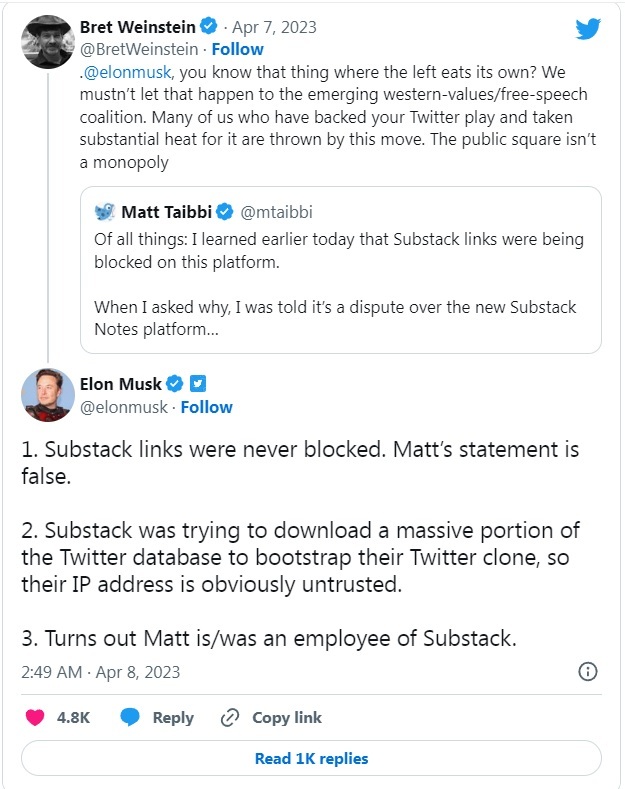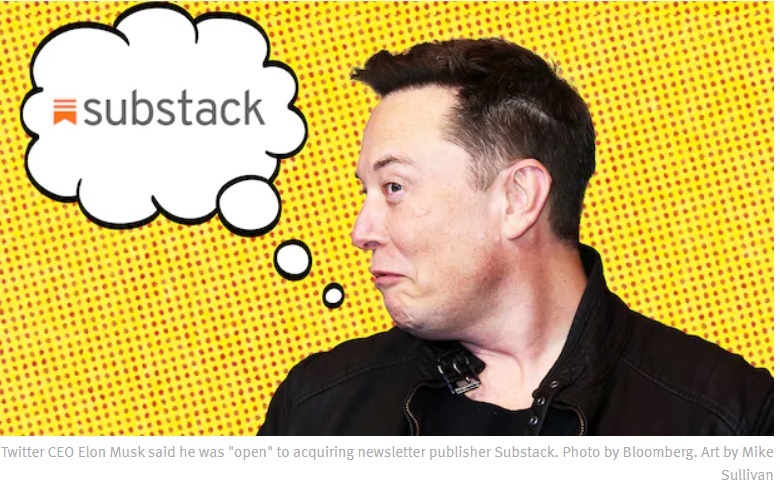
by Brian Shilhavy
Editor, Health Impact News
As we watch the collapse of Big Tech and their financial institutions, popular content platform provider Substack’s recent financial statements show that they too may soon be a casualty of reckless spending by Silicon Valley venture capitalists.
I have explained in previous articles that the Big Tech way of investing in startup companies is to invest in tech companies that become popular with users and begin to build a large database of users, and then hope that the company will one day actually start earning money and turn a profit for its investors.
Some companies, like Amazon.com, continued to raise capital from investors for about 10 years before it figured out how to make a profit, but now this business model is crashing down, as cheap money is gone, along with some of the banks that thrived on cheap money in the tech sector, like Silicon Valley Bank.
It was reported yesterday that recent financial filings with the SEC show that Substack is burning through cash too quickly, and they have been having a hard time raising new capital.
Substack, the publishing platform, burned through roughly $25 million in cash in 2021, newly disclosed financial statements reveal, reflecting the expansion undertaken that year after Substack raised $65 million in a fundraising. In 2020 Substack had burned through just over $1 million.
Substack’s financial statements were filed with the SEC just a couple of weeks after the company began trying to raise a small amount of money from individual writers, at its 2021 valuation of $650 million. The financial statements don’t include 2022 results, making it difficult to assess the current state of the business.
But they do show that Substack’s expenses skyrocketed as a result of its expansion in 2021, causing enormous losses, and explaining why the company last year took steps to cut its spending.
For instance, in 2021, Substack had gross revenue of $11.9 million, mostly its cut of subscriptions paid to writers. But the financial statements show that Substack paid out to writers more than it took in, because it had guaranteed some writers a minimum amount of income. As a result, Substack reported negative revenue, which is unusual. In addition Substack had to pay salaries of its own staff and other expenses. (Source.)
A huge part of that “expansion” in 2021, of course, came from the multitude of publishers publishing the truth about the COVID-19 bioweapon shots who were kicked off of the popular social media sites for publishing dangerous “conspiracy theories,” and moved their content onto Substack instead.
Mercola.com was one of the largest names who began publishing on Substack, which drew a sharp criticism from Elizabeth Dwoskin of the Washington Post:
Joseph Mercola, a leading anti-vaccine advocate whose screeds have been restricted by YouTube and Facebook, this month warned that the unvaccinated might soon be imprisoned in government-run camps. The week before, he circulated a study purporting to use government data to prove that more children had died of covid shots than from the coronavirus itself.
Shut down by major social media platforms, Mercola has found a new way to spread these debunked claims: on Substack, the subscription-based newsletter platform that is increasingly a hub for controversial and often misleading perspectives about the coronavirus.
Substack, which researchers from the nonprofit Center for Countering Digital Hate say makes millions of dollars off anti-vaccine misinformation, on Wednesday defended its tolerance for publishing “writers with whom we strongly disagree.” (Source.)
It appears that adding all these “writers with whom we strongly disagree” from the Alternative Media still did not make the company profitable, however.
Substack has been in the news this week for another reason: a public argument between journalist Matt Taibbi, famous for publishing “The Twitter Files,” and the current owner of Twitter, Elon Musk.
Taibbi has stated he is leaving Twitter over alleged censorship on Twitter regarding Substack writers, something Elon Musk denies.
After a new product announcement this week, links to Substack from tweets have been subject to a variety of seemingly punitive actions and tweet embeds stopped working in Substack posts, leading to face of the Twitter Files Matt Taibbi announcing he is leaving Elon Musk’s app for good. But Musk says the claims made about the feud are “false” and implied Taibbi had a financial stake in making them.
Taibbi said in his remarks that he learned Friday “Substack links were being blocked on Twitter.”
In a tweet on Saturday, Musk called that statement “false” and said the journalist is an “employee” of Substack…
Substack co-founder Chris Best denied that Taibbi was an employee of Substack, but he did not actually deny that they were, in fact, downloading a “massive portion” of Twitter’s database, writing that what they were doing was “in compliance with the terms” of Twitter.
Substack co-founder Chris Best then rejected Musk’s claim that Substack was downloading Twitter data outside of the bounds of its API database. “We believe we’re in compliance with the terms, but if they have any specific concerns we would love to know about them! We’d be happy to address any issues,” wrote Best. (Source.)
Same Owners Behind Substack as Twitter
As much as Taibbi and others are trying to frame this conflict as censorship by Twitter over Substack because they are afraid Substack is going to compete with them, the evidence seems to point to the opposite, given the fact that Substack is reported to be bleeding huge financial losses, and that venture capital firms turned them down in 2022 to raise more money.
That includes Andreessen Horowitz, who is heavily invested in BOTH Twitter and Substack, as well as Elon Musk himself, who reportedly had an opportunity to buy Substack last year, but declined.
In December of 2022, The Information reported:
Could Twitter’s new billionaire owner Elon Musk buy Substack? Musk tweeted that he’s “open” to acquiring the newsletter publisher after a Twitter user floated the idea on Friday, suggesting a deal would give Musk control of the “the narrative layer” of the internet.
In March 2021, investors led by Andreessen Horowitz valued the San Francisco startup at $650 million, or what turned out to be 72 times the revenue the company reportedly generated last year. In the following months, Substack apparently even sought a higher price—to no avail. This May, it dropped efforts to raise new funding, which targeted a valuation as high as $1 billion, The New York Times reported.
Since mid-2021, of course, the valuations of both consumer startups and public tech and media companies have dived. (Source.)
All the evidence points to the same kind of financial troubles that other Big Tech companies are currently suffering which are leading to massive layoffs: “cheap money” has now disappeared since the Fed began raising interest rates, and these bloated Big Tech companies have been caught with their pants down, showing that their business model of investing first, and hoping you can earn a profit later, just won’t work anymore.
When Substack had huge bank accounts from venture capitalists, they could lure in authors by paying them the money off of subscriptions, and then just assume the capital venture firms would keep funding them to pay their other salaries and expenses.
This was published in August of last year (2022):
Substack shook up traditional media last year, offering six-figure cash advances and benefits including healthcare to recruit writers for a newsletter platform that publishes high-profile authors like Bari Weiss and Glenn Greenwald.
But this year, the San Francisco startup has told some writers it is scaling back such perks, joining a group of tech companies reassessing the way they lure independent writers and online performers after a frenzied battle for talent in the past two years.
Some newsletter writers say Substack earlier this year told them it would be reducing the frequency of upfront payments. The five-year-old company, which has raised $82 million from Andreessen Horowitz and other investors, also said it has cut a healthcare subsidy it was offering to some top writers.
“2021 was a year that we could be less cautious in terms of how we use our resources to help writers get off the ground and help them start their businesses,” McKenzie said. Now “we have to be much more cautious. We have to think ahead. We can’t just bank on easy-to-get venture capital at good prices to be there, to be able to pass on to writers immediately.” (Source.)
I published my own concerns about Substack at the end of last year, stating that Substack is owned by the same investors that own other Big Tech companies such as Twitter, and that they appeared to have little to no concerns about privacy.
Protecting Your Privacy Should be a High Priority in 2023 – Beware of Substack!
Excerpt:
One of the biggest dangers to potential online tracking that I have seen develop this past year is in the sheer amount of content providers in the Alternative Media who have moved their content over to the Substack.com platform.
Like Twitter, which is trying to lure Conservatives and Alternative Health publishers back onto its platform, probably with the goal of monitoring and tracking everyone who follows them, so too could the Technocrats who run Substack be doing in the same thing.
Substack.com is a convenient way for authors and publishers to manage and monetize their content.
But at what cost?
There are huge Silicon Valley Big Tech investors behind Substack, including some of the same investors behind Big Tech Social Media sites.
Venture Capitalist Andreessen Horowitz allegedly provided $15.3 million in Series A funding for Substack in 2019. (Source.)
In 2011, Andreessen Horowitz allegedly invested $80 million in Twitter, becoming the first venture capital firm that held stock in all four of the highest-valued, privately held social media companies at the time: Facebook, Groupon, Twitter, and Zynga. (Source.)
When Elon Musk stepped up to the plate to purchase Twitter earlier this year, Andreessen Horowitz provided another $400 million as one of the co-owners of Twitter. (Source.)
I have tried subscribing to a few Substack authors, and when their newsletter is delivered to you via email, all the links in the email are appended with Google tracking codes. So I know, at the very least, that Substack is making data available to Google.
Here is a list of personal data that Substack admits to collecting:
What Information does Substack collect?
We collect and process Personal Information about you when you interact with us and our services, as well as when you subscribe to any of our paid or unpaid services. This may include:
- your first and last name;
- your email address;
- your phone number;
- your payment details (including billing address, credit card details, where you make a purchase from us);
- your location and/or mailing address;
- your photograph;
- your marketing preferences, including any consents you have given us;
- information related to the browser or device you use to access our website (including your IP address);
- any information we collect online from you and maintain in association with your account, such as your username and password;
- your subscription status with Substack newsletters;
- any other information you provide us when communicating with us.
We also collect information on the use of our website via Cookies. (Source.)
Read the full article here.
I am sure people will continue to blame Elon Musk and his “censorship” for Substack’s problems, but it appears that Substack is suffering the fate of most other Big Tech companies these days, and that is a false belief in the technology and that it will just continue to grow and start producing more sophisticated programs, like AI robots that will replace humans.
The market will at some point confirm what I have been saying since last year, however, which is that this is a false belief, and when the current AI feeding frenzy stops and that financial bubble bursts, so too may the entire U.S. economy, as we will pay the price for this false belief in technology.
Related:
Big Tech Fail: Not Enough Computers in the U.S. to Develop New AI Software
And before you email me to tell me how wrong I am about technology and how AI is going to take over the world based on what someone else said who you consider an “expert,” please read about my own experience and credentials in Technology:
This article was written by Human Superior Intelligence (HSI)
See Also:
Understand the Times We are Currently Living Through
New FREE eBook! Restoring the Foundation of New Testament Faith in Jesus Christ – by Brian Shilhavy
Who are God’s “Chosen People”?
KABBALAH: The Anti-Christ Religion of Satan that Controls the World Today
Christian Teaching on Sex and Marriage vs. The Actual Biblical Teaching
Exposing the Christian Zionism Cult
The Bewitching of America with the Evil Eye and the Mark of the Beast
Jesus Christ’s Opposition to the Jewish State: Lessons for Today
Identifying the Luciferian Globalists Implementing the New World Order – Who are the “Jews”?
The Brain Myth: Your Intellect and Thoughts Originate in Your Heart, Not Your Brain
What is the Condition of Your Heart? The Superiority of the Human Heart over the Human Brain
The Seal and Mark of God is Far More Important than the “Mark of the Beast” – Are You Prepared for What’s Coming?
The Satanic Roots to Modern Medicine – The Image of the Beast?
Medicine: Idolatry in the Twenty First Century – 10-Year-Old Article More Relevant Today than the Day it was Written
Having problems receiving our emails? See:
How to Beat Internet Censorship and Create Your Own Newsfeed
We Are Now on Telegram. Video channels at Bitchute, and Odysee.
If our website is seized and shut down, find us on Telegram, as well as Bitchute and Odysee for further instructions about where to find us.
If you use the TOR Onion browser, here are the links and corresponding URLs to use in the TOR browser to find us on the Dark Web: Health Impact News, Vaccine Impact, Medical Kidnap, Created4Health, CoconutOil.com.

























2 Comments